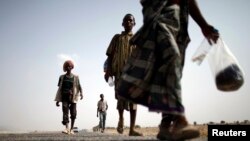The U.N. refugee agency is warning refugees and migrants from the Horn of Africa not to make the perilous journey across the Red Sea to Yemen. The UNHCR says thousands of people continue to arrive in the country despite the dangers.
The latest United Nations figures put the number of civilians killed in Yemen since Saudi Arabia began its bombing campaign on March 26 at 1,670, with more than 3,800 wounded.
Aid agencies report the escalation of the war has caused a sharp deterioration in the humanitarian situation, with four out of five Yemenis or 21 out of 25 million people now in need of assistance.
Notwithstanding this dire situation, the U.N. refugee agency reports Somalis and Ethiopians continue to arrive in this war torn country. Of the 37,000 who have come to Yemen this year, UNHCR representative in Yemen Johannes van der Klaauw says 10,000 have arrived since the end of March.
"People are either not informed, particularly the migrants or they take the deliberate choice to still come to a country at war because the economic migrants amongst them are on their way to Saudi Arabia and it is the only way to get there," he said. "But, there also are still Somalis coming who still flee persecution in Somalia and say they are safer in Yemen not withstanding the war than they would be staying back in Somalia.”
Information campaign
Van der Klaauw says many people may not be aware of the dangers they face in Yemen. Therefore, he says, the UNHCR and other agencies are running a mass information campaign in Somalia and Ethiopia to deter prospective migrants and refugees from coming.
Yemen currently hosts 240,000 Somali refugees and 10,000 migrants from Ethiopia, Eritrea, Syria, and Iraq. Van der Klauuw says 51,600 Yemenis, Somalis, Ethiopians and nationals from other countries have fled Yemen over the past three-and-one-half months.
He says most have gone to Djibouti, Somaliland, Puntland, and Somalia — some to Oman.
“The Somalis all self-evacuated. They at great risk go to the ports of Mokala, Hodeidah, Moka — even Aden when it was possible," he said. "They organize their own departure… It is difficult for them to organize their trip. There is, of course, money involved.”
Van der Klaauw says this is not a repatriation operation and the UNHCR is not facilitating these returns. However, he says the UNHCR and the International Organization for Migration are trying to help these desperate people better organize their departure.
He says disabled people, widows with children, and the elderly are particularly vulnerable and in need of protection. He says he worries about what awaits them when they arrive in Somalia.




